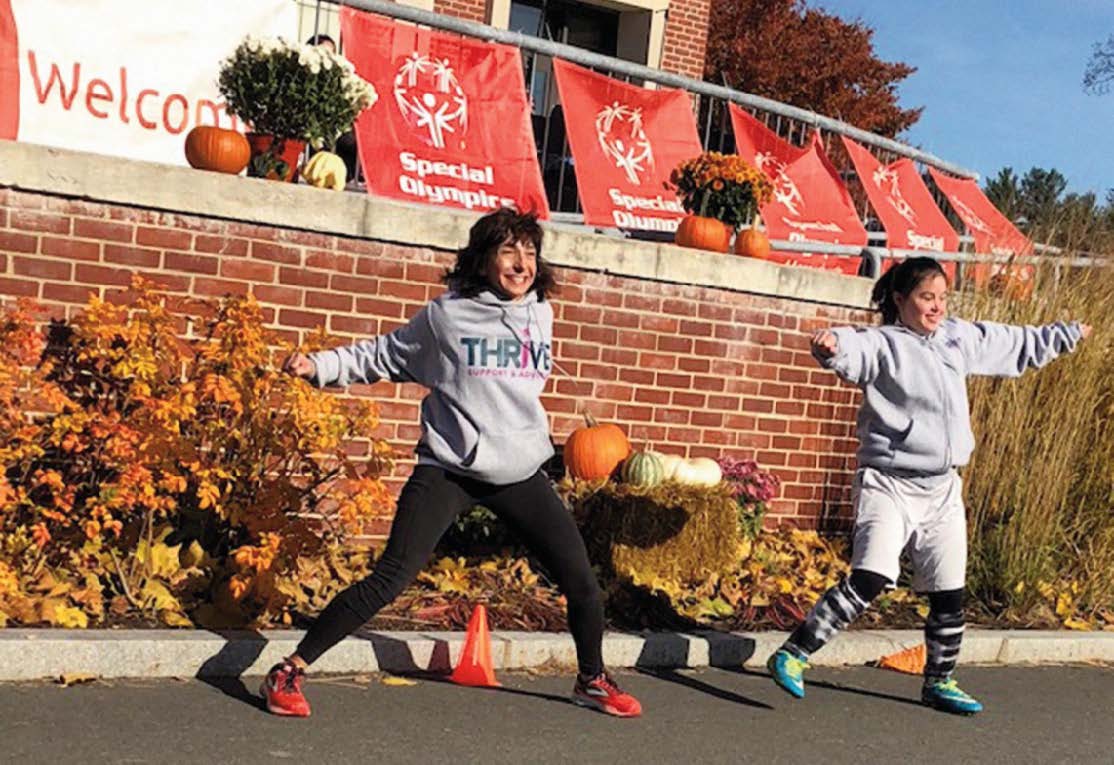
BY LYNN ERICKSON AND RENEE DEASE
It's a typical, deeply-frozen March morning in the northeastern United States. Even seasoned Malborough, Massachusetts residents cozy up inside and only plan on making an outdoor trek to their vehicles and back. But when they glance out their windows, they might catch a glimpse of a familiar sight. Rain, shine or snow, Beth Donahue can be found jogging along with her yellow lab, Cooper.
"That dog is fit, let me tell you," Beth, 28, and her mother Gina exchange a knowing look and laugh. Beth is the epitome of fitness. She is in remarkable shape and active every day doing exercise she enjoys – running with Cooper, leading an exercise class, or skiing with her father to name just a few. Her average daily diet might include an English muffin with almond butter, yogurt, fruits, almonds, salad with protein like chicken or turkey. To relax, she reviews YouTube videos of exercises she can employ or adapt for a weekly exercise class she leads.
For some, it may come as a surprise that Beth is a Special Olympics athlete of more than 20 years. Beth competes in soccer, skiing, track and field, and softball. Beth is among the growing throng of Special Olympics athletes and families who are embracing a healthy lifestyle in all facets of life and influencing others within their community to do the same.
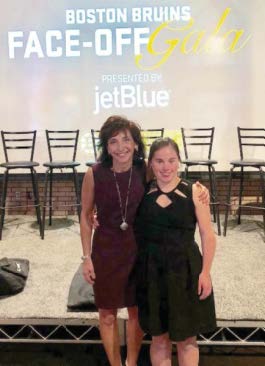
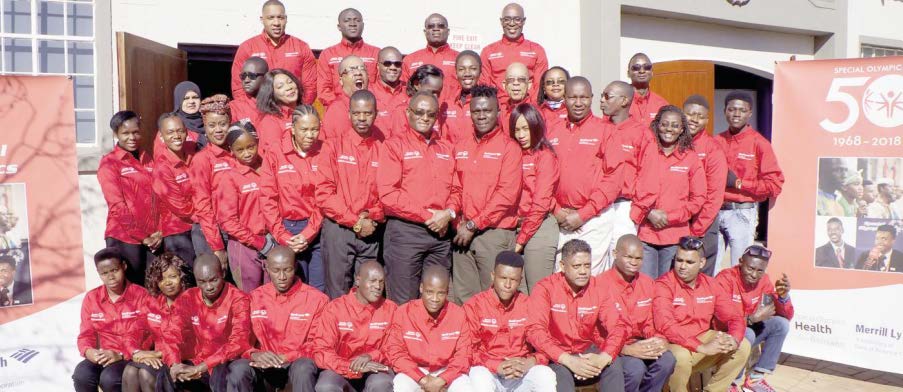
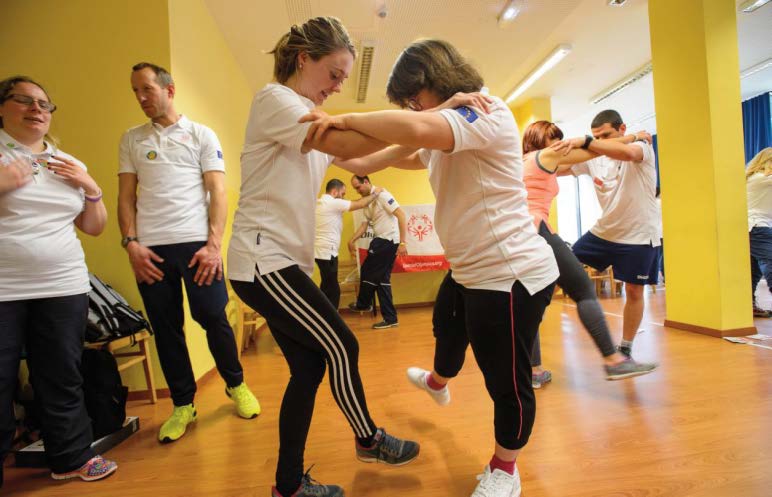
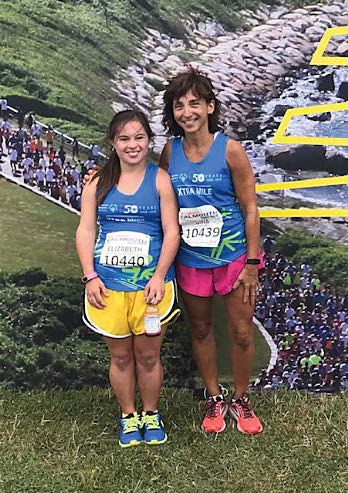
FOLLOW THE LEADERS: (Opposite page) Beth and Gina lead the athlete warm-up at the start of the Special Olympics Massachusetts' State Soccer Finals; (Above, clockwise) Beth discusses the positive impact of sports with a group of Boston Bruins' players at the Face-Off Gala (and then goes off script and gets them all up on stage to do Zumba); Twenty athlete leaders from Benin, Botswana, Côte d'Ivoire, Kenya, Malawi, Mauritius, Namibia, Nigeria, Rwanda, Senegal, South Africa, Tanzania Zambia, and Zimbabwe train as Special Olympics Health Messengers in 2018; Beth and Gina pose after completing the 7-mile Falmouth Road Race; Physical fitness is a key part of the Special Olympics' mission. Additional fitness activities beyond sport are improving athletes' sport performance, health and lives.
"Living a healthy lifestyle makes me feel empowered and self-confident," Beth shares. "I can spread that to other people, too. I encourage people to do something active every day. If I can do it, anyone else can, too." Humility pours out of Beth, but this leader's accomplishments are extraordinary. Here are just a few of them: Beth is in the midst of working with Boston Bruins Foundation to film a series of fitness training tips. She learned American Sign Language while at a Transitional Scholars program at Mass Bay Community College and now signs "Support your local athlete" at the end of her presentations to Special Olympics supporters.
Beth and Gina trained athletes heading to the 2018 Special Olympics USA Games in Seattle. They both taught inclusive Zumba classes in the community for eight years and began an adaptive bootcamp course in 2018 that has been very well received. Beth works two jobs and is preparing to move out on her own, navigating around the Boston area via train. She also spoke at the NIRSA sports conference to more than 2,000 people about the impact of Special Olympics Unified Sports to expand the idea of inclusion and community through sports.
But if you ask Beth and Gina what makes them feel proud, it is not their accomplishments, but the accomplishments of others they have worked with the past eight years.
"It hits me how far some of our friends have come," Gina says. "We have been able to see positive change through our adaptive bootcamp course. Within a matter of four to six weeks, we are observing some clear differences. When I look in the mirror and see all 15 young adults doing a shoulder press above their heads with all of the confidence that anyone else would have, it really is a good feeling. People have more strength when they're doing exercises and for everyday activities."
It is well documented that people with intellectual disabilities are less active than the general population. This is not due to their disability, but the lack of access to fit ness education and opportunities that fit their needs. Special Olympics' mission is to provide sports opportunities for people with intellectual disabilities. In order for athletes to truly perform at their best, they must be fit and healthy. The reality is that some Special Olympics athletes only practice their sport once a week, and competition seasons are only about three months long. This leaves a large gap throughout the year where athletes live sedentary lifestyles, putting them at risk for obesity, osteoporosis, high blood pressure, and diabetes.
The best way to find a solution to the lack of access to fitness education and opportunities is to have the solution driven by the people who face these challenges daily. People with intellectual disabilities, like Beth, are guiding communities across the world toward solutions. The Special Olympics Health Messenger program, now with more than 160 individuals trained globally, was developed to address this need. In order to create more effective public health programs, improve health systems and engage communities to support the health of people with intellectual disabilities, people with intellectual disabilities must have leadership roles. After training with Special Olympics personnel, the trained athlete-Health Messengers return home with increased confidence and a clear understanding of the steps involved to lead activations, raise awareness, and mobilize and influence community members and key decisionmakers to be more inclusive of people with ID. Beth – who was trained as a Health Messenger in 2018 - and her mom Gina are examples of the success that Health Messengers are recording across the world.
"We had a new friend start Zumba classes with us a few years ago. She came in the back of the class and cried. She was overwhelmed, unsure of where she fit in and feeling uncomfortable," Gina continues. "Over the course of a few years, we became closer and she became more comfortable. I was looking at her doing sit ups at bootcamp last night and it really struck me. 'Okay, we're making a change one step on a time.' We try to give people new ideas of how they can be strong and new ways to be independent. Our friends at class have the opportunity to explore new skills, feel included, and feel like they are part of the community. We didn't know what to expect with this class when we changed from a once-a-week Zumba class, but it has been wonderful. Young people with disabilities don't always have a chance or the setting to push weights over their heads or do pushups."
Gina, with her background as a professional fitness trainer, and Beth, make a dynamic duo. With individuals like them at the helm of Special Olympics Inclusion Revolution, there is much-needed change happening in many pockets of the world. But stats show that more work is needed. If you happen to live in the Boston area, join Beth and Gina for a great workout. •
Join Special Olympics' "The Revolution is Inclusion" to make a difference in your community today.
ABOUT THE AUTHORS: Lynn Erickson is a manager of health communications for Special Olympics. Renee Dease is an Olympics athlete and the Healthy Athletes coordinator at Special Olympics International.